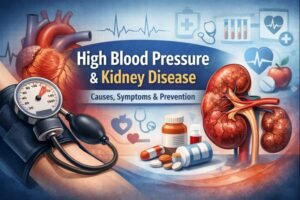Millions of people suffer from kidney stones, a common but painful ailment. They develop when hard deposits of minerals and salts accumulate in the kidneys. Kidney stone prevention mostly comes down to lifestyle choices, however genetics and medical factors can sometimes play a part. You may greatly lower your risk and safeguard your kidney health over time by adopting the proper diet, hydration, and lifestyle choices. Let’s see how kidney stones can be avoided before they occur.
What Are Kidney Stones and Why Do They Form?
Your kidneys may develop small, hard deposits called kidney stones. They consist of salts and minerals that begin to cling to one another in your urine and finally crystallize. These crystals may eventually develop into stones as they pass through the urinary tract, which can be quite uncomfortable.
Your kidneys may develop small, hard deposits called kidney stones. They consist of salts and minerals that begin to cling to one another in your urine and finally crystallize. These crystals may eventually develop into stones as they pass through the urinary tract, which can be quite uncomfortable.
Top Tips for Preventing Kidney Stones
Kidney stone prevention doesn’t have to be difficult. Your risk can be considerably decreased by making a few easy adjustments to your everyday routine. Hydration is crucial, first and foremost. By keeping your urine diluted throughout the day, drinking lots of water helps stop minerals from crystallizing. Try to consume eight glasses or more if you’re an active person.
Next, be mindful of how much salt you eat. Consuming excessive amounts of sodium raises the calcium content of your urine, which can cause stones to form. To reduce your salt intake, try consuming fewer processed meals, canned goods, and fast food items.
Eating citrus fruits, including lemons and oranges, can also be advantageous. The citric acid in these fruits prevents calcium-based stones from forming. Keep in mind calcium as well, but take it sparingly. The opposite is true, despite the widespread belief that it is advantageous to stay away from foods high in calcium. A nutritious diet that includes enough calcium can help prevent stones.
Lastly, if kidney stones are an issue for you, stay away from foods high in oxalates, such as spinach, beets, and nuts. It is advised to balance them with foods high in calcium to decrease the effect. These may increase the likelihood of oxalate stones.
Diet and Hydration’s Role in Kidney Stone Prevention
What you eat and drink has a big impact in preventing kidney stones. The easiest and most efficient method to lower your risk is to stay hydrated. By keeping your urine diluted, drinking lots of water reduces the likelihood that minerals may crystallize into stones. Try to stay hydrated by drinking enough water to make your urine pale yellow.
Balance is crucial when it comes to your food. Calcium-rich foods, such as leafy greens and dairy products, are vital, but it all depends on consuming the proper quantity. Reducing excessive consumption of sugar and salt can also be beneficial because they both raise the chance of stone development.
Citrus fruits like oranges and lemons can be your friends. Its citric acid can help dissolve kidney stones or prevent them from forming at all. Thus, a simple way to stay hydrated and protect your kidneys is to squeeze a little lemon juice into your drink.
Remember that everything, including healthy foods, can backfire if taken in excess. Maintaining a nutritious diet and drinking adequate water can help prevent kidney stones from forming.
When to Seek Medical Treatment for Kidney Stones
When severe pain hits—especially with fever, chills, or blood in your urine—it’s crucial to seek help immediately. These signs indicate that kidney stone prevention through lifestyle changes may not be enough, and complications might be developing. Even if discomfort eases briefly, persistent symptoms or trouble staying hydrated are clear red flags. Early intervention is essential for kidney stone prevention and for managing kidney stones effectively. Always trust your instincts and contact your healthcare provider right away to protect your kidney health and prevent issues with calcium oxalate stones.
The Long-Term Benefits of Prevention
Focusing on preventing kidney stones pays off in the long run. Adopting healthy habits like proper hydration and a balanced, kidney-friendly diet not only reduces painful episodes but also strengthens your overall kidney health. Effective kidney stone prevention helps minimize emergency visits and invasive treatments down the road. Over time, these proactive steps lead to a smoother, more enjoyable life. You feel better, experience fewer disruptions, and gain peace of mind—knowing you are taking solid care of your kidneys and overall well-being.
Stay Ahead of Kidney Stones
By focusing on preventing kidney stones today, you set the stage for a healthier tomorrow. Embrace smart hydration and a balanced diet for lasting kidney stone prevention. When you stay proactive, you reduce the risk of pain and complications. Remember, taking care of your kidneys now leads to a brighter, stone-free future.
Tips for Managing Diabetes to Protect Kidney Health
Living with diabetes can be challenging, but simple, mindful habits can make a big difference in your diabetes and kidney health. Start by keeping a close eye on your blood sugar and following your prescribed treatment. Embrace a diet full of fresh, whole foods, and ease up on sugar and processed meals. Opt for lean proteins and colorful vegetables that support steady blood sugar levels and reduce kidney strain. Keeping your salt intake low is important, too, as it helps manage blood pressure. Regular walks or light exercise not only boost your mood but also improve overall health. Stay well-hydrated, and lean on your healthcare team for guidance. Every small step counts toward a healthier future.
Lifestyle Changes for Better Kidney Health
Simple lifestyle changes can truly make a big difference in your kidney health. For those managing diabetes, everyday habits matter immensely. Prioritizing good sleep, regular exercise and balanced meals supports diabetes and kidney health. Even minor adjustments can reduce kidney stress and boost overall well-being. They lead to lasting benefits.
Incorporating fresh fruits, vegetables, and whole grains while limiting salt and processed foods further supports kidney function. Staying well-hydrated and monitoring blood sugar levels are essential for optimal kidney performance. Work with your healthcare team to design a personalized plan that promotes kidney health every day and improves your quality.
Stay Proactive, Stay Healthy (Conclusion)
Staying proactive about your health is the best way to protect your kidneys. With consistent care and smart choices, you can keep your diabetes and kidney health in check. Regular checkups and a balanced lifestyle go a long way. At Southern Oklahoma Kidney Center, we’re here to support you every step of your journey to lasting well-being.




